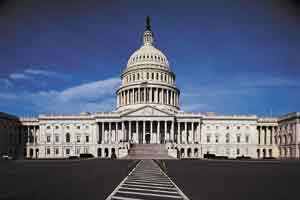US lawmakers in preliminary agreement on Bush's $700 billion bailout package
29 September 2008
 After days of hectic negotiations and fierce debates among American lawmakers, there seems to be some progress finally on the Bush administration's proposed $700 billion bailout package for distressed Wall Street entities (See: Bush's bailout plan under attack by Republican legislators). However, in its final form, the largesse may be halved to $350 billion, with the rest requiring additional approval from the US Congress.
After days of hectic negotiations and fierce debates among American lawmakers, there seems to be some progress finally on the Bush administration's proposed $700 billion bailout package for distressed Wall Street entities (See: Bush's bailout plan under attack by Republican legislators). However, in its final form, the largesse may be halved to $350 billion, with the rest requiring additional approval from the US Congress.
On Sunday morning, Congressional leaders and the Bush administration issued the first conciliatory statements on the controversial plan, with some stating that a vote was possible as early as Monday.
 The negotiations were completed about midnight when lawmakers agreed to require the president to offer a plan to recoup any loss to the taxpayers after five years, said a Democratic congressional aide. That clause was intended to address concerns about the cost of the program.
The negotiations were completed about midnight when lawmakers agreed to require the president to offer a plan to recoup any loss to the taxpayers after five years, said a Democratic congressional aide. That clause was intended to address concerns about the cost of the program.
The agreement alters the Bush administration's original request for unchecked authority to purchase distressed debt securities from financial companies reeling from the record number of home foreclosures. That plan evoked a blizzard of emails and phone calls from voters outraged at being asked to foot the bill for the mistakes of Wall Street investors.
During weeklong negotiations, lawmakers reduced the initial cost by half to $350 billion, with the remainder to be authorised later, and they added provisions creating an oversight structure and help to homeowners facing foreclosure.
The compromise also includes a proposal by House of Representatives Republicans, whose objections scuttled an earlier agreement in principle that provides for government insurance for mortgage-backed securities. The Treasury department would be required to create a federal insurance program, funded by the banks, which would guarantee banks and other firms against loss from any troubled asset.
